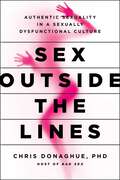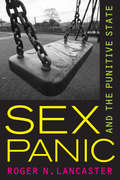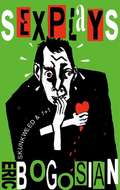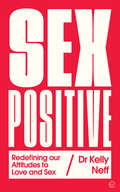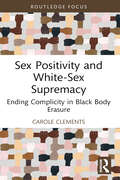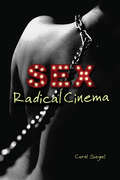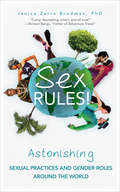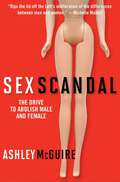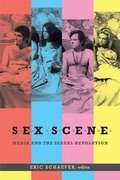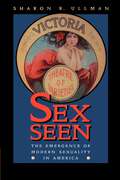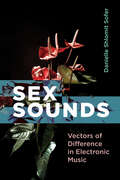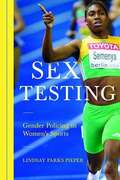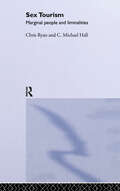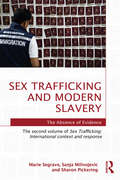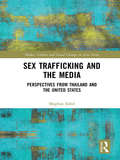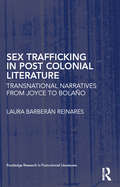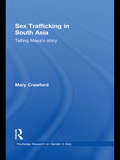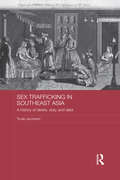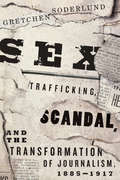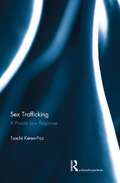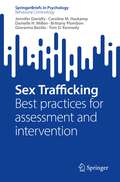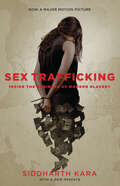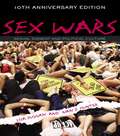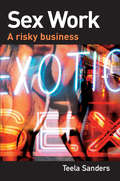- Table View
- List View
Sex Outside the Lines: Authentic Sexuality in a Sexually Dysfunctional Culture
by Chris DonaghueIt's socially acceptable to spend a day watching sports or sitcoms, but it's shameful and embarrassing to admit to the same about erotic media. Why is it that sex is so often deemed "inappropriate" and considered something we must keep private or even ignore? Our culture is afraid of sex. We feel the need to label what is normal and what isn't, and as a result, we live in a relational and sexually unhealthy culture. In reality, far more harm is caused by labeling sexual expression as "obscene" than by celebrating it. In Sex Outside the Lines: Authentic Sexuality in a Sexually Dysfunctional Culture, Chris Donaghue, PhD, explores and challenges the negative ideals that have warped society's view of sex. Sex Outside the Lines is not a dogmatic rule book, but a valuable guide to help you on your journey to sexual self-discovery and, most important, self-acceptance. Donaghue encourages you to not only explore your capacity for pleasure, but to be proud of it and to take a look at how you could be living. In his years of training in sex and couples therapy, Donaghue has developed highly successful methods for freeing clients from sexual hang-ups, enabling them to let go of shame and embarrassment. The goal isn't to be "normal"—there is no such thing. Donaghue pulls apart cultural phobias with a sex-positive therapy practice, as well as a kind of sexual deprograming that helps people see and accept that the desires they have—even if they don't align with society's expectations—are actually natural, healthy, and part of having a great sex life. Sex Outside the Lines addresses our diversity, challenges conventional psychiatric wisdom as classifying perfectly normal behavior as disorders, and disregards conventional advice from leading experts. It isn't advocating a "liberal" approach to modern concepts—it is seeking to redefine them altogether.
Sex Panic and the Punitive State
by Roger N. LancasterOne evening, while watching the news, Roger N. Lancaster was startled by a report that a friend, a gay male school teacher, had been arrested for a sexually based crime. The resulting hysteria threatened to ruin the life of an innocent man. In this passionate and provocative book, Lancaster blends astute analysis, robust polemic, ethnography, and personal narrative to delve into the complicated relationship between sexuality and punishment in our society. Drawing on classical social science, critical legal studies, and queer theory, he tracks the rise of a modern suburban culture of fear and develops new insights into the punitive logic that has put down deep roots in everyday American life.
Sex Plays
by Eric Bogosian"A born storyteller with perfect pitch."--The New York Times "Greatly and bilaterally talented . . . spiky, stinging, caustic without cauterizing. And funny."--New York One of America's premier performers and most innovative and provocative artists offers his two newest plays: Skunkweed details the culture clash between a Los Angeles screenwriter and a working-class girl and her rural Florida clan in a hotel room, and 1+1 explores desire, greed, and responsibility to others through the lives of an aspiring actress, assistant restaurant manager, and a photographer. About the characters in 1+1, Eric Bogosian recently stated, "Bri, Phil, and Carl are based on people I've found intensely interesting my whole life: a good-looking hustler, an ambitious pretty girl, and a 'good guy' who always seems to finish last. . . . The story is a parable. All my plays are. My plays are not expositions of a specific time and place. Rather, I try to find a way to set them so that the audience can immerse itself in a situation. I don't have answers. I have questions." Eric Bogosian is a writer and actor who has authored five full-length plays and created six full-length solos for himself, including Talk Radio; subUrbia; Sex, Drugs, Rock & Roll; Pounding Nails in the Floor with My Forehead; and Drinking in America. He is the recipient of three OBIE Awards and a Drama Desk Award, and has toured throughout the United States and Europe.
Sex Positive: Redefining Our Attitudes to Love & Sex
by Dr. Kelly NeffOffering a new take on the psychology of human sexuality, Sexpositive integrates modern day themes such as technology and the use of social media with self-help. This is the book that millennial's will turn to in order to rewrite the story of their love lives.Life on this planet would not exist if it weren&’t for one thing, sexual intercourse! Developing our understanding sexual consciousness; defined as an awareness of each other and ourselves as sexually conscious beings, is key if we want to see humanity evolve and thrive through our energetic awareness of one another. The SexPositive movement has its roots in this founding ideology. It is a social, political and philosophical movement that promotes and embraces sexuality and sexual expression, with an emphasis on safe and consensual sex. Never before has there been a stronger cultural narrative about the awakening of our sexual consciousness and the crucial importance of building #SexPositive relationships. For the first time ever, Dr. Kelly Neff offers readers a ground-breaking self help book that fuses scientific sexology research, psychological theorizing, Eastern & Western philosophies, and stories from around the world, all in the context of the world&’s massive social and political shifts surrounding sex, love and identity. The first part of the book address our personal growth as sexually conscious beings in our current cultural climate, unpacking the constructs of gender and sexual orientation, social conditioning via mass media, whilst exploring non-monogamous relationships, the Techno sexual Revolution, as well as looking at sex as an energetic experience. The second part of the book takes a more practical approach providing tools, tips and exercises to help create and maintain SexPositive relationships.
Sex Positivity and White-Sex Supremacy: Ending Complicity in Black Body Erasure (Leading Conversations on Black Sexualities and Identities)
by Carole ClementsThis text critically examines, argues, and demonstrates how the sex-positive movement is complicit in the perpetuation of White Supremacy and anti-black bias in the field of human sexualities, offering white sexuality professionals embodied ethical antiracist strategies for sexual inclusion and transformational change. In a world where whiteness is considered the sexual and bodily norm, Carole Clements proposes that the sex-positive movement has failed to examine how it maintains White Supremacy through the guise of inclusivity, and how the lack of a critical understanding of what "sex-positive" means has caused harm to black, indigenous, and people of color (BIPOC) individuals and communities alike. Pivoting away from a sex-positive/sex-negative binary, this book establishes a sex-critical discourse by introducing and operationalizing the term "White-sex Supremacy" to produce a racially just and embodied sexual ethic. Chapters begin by looking at sexual science and its racial origins, recounting how both the science of sex and that of race strived for positivist legitimacy in the same historical moment. Moving from the social construction of racial and sexual hierarchies, chapters look at eugenics and sexology’s early "sex-positive" pioneers, such as Margaret Sanger and Havelock Ellis, before examining the establishment of a race-evasive yet distinctly white sexual normality reliant on sex-positive framing. It shows how sex positivity became a popularized term without a clear definition other than "good," and how the legacy of white fragility leads to complicit white silence and the erasure of Black sexualities. Theoretical, practical, and accessible, it offers tangible methods for white sexuality professionals and scholars to learn accompliceship (over allyship) to promote antiracist sexual justice activism. This book is essential reading for white sexuality professionals, including sex educators, sex therapists, marriage and family therapists, licensed professional counselors, psychotherapists, gynecologists, and nurses, who are committed to examining their whiteness in the context of their commitment to sex positivity.
Sex Radical Cinema
by Carol SiegelIn this provocative study of cinematic and televisual representations of "sex radicalism," Carol Siegel explores how representations of sexually explicit content on film have shaped American cultural visions of sex and sexual politics in the 21st century. Siegel distinguishes between a liberal approach to visual representations, which has over-emphasized normative equal opportunity while undervaluing our distinctive erotic selves, and a radical approach to visual representation, which portrays forbidden sexualities and desires. She illustrates how visual media participates in and even drives political policies related to pedophilia, prostitution, interracial relationships, and war. By examining such popular film and television shows as Mystic River, The Wire, Fifty Shades of Grey, Batman Returns, and the HBO hits, Sex and the City and Girls, Siegel takes the discussion of radical sex in the movies out of the margins of political discussions and puts it in the center, where, she argues, it has belonged all along.
Sex Rules!: Astonishing Sexual Practices and Gender Roles Around the World
by Janice Zarro Brodman PHD“[Brodman] shares the results of years of research and world travel to show . . . just how wildly divergent ideas about sexuality and gender roles can be.” —Vice This book is a humorous glimpse of a wide range of stereotype-busting sexual, relationship, and romantic mores around the world. It is fun, interesting, and eye-opening! For example, places where women control the mating game, set marriage rules, and marry one another for political power. The fact that it’s all true also makes it fascinating. Take a romp through a rollicking worldwide tour with LOL views of extraordinary sexual customs. It will astound and regale you. At the same time, it proves sex is like happiness—universally sought but subjectively enjoyed. “This is the world’s weirdest and funniest reality show. But it’s more. It’s fascinating and smart, and all true.” —Richard Bangs, adventurer, author, and TV personality “It’s a scientific fact! Women have better orgasms with funny partners. Read this hilarious book and you’ll have more and better sex, happier relationships and a healthier libido!” —Joanne Sandler, former Deputy Executive Director of the UN Development Fund for Women (UNIFEM), senior associate of Gender@Work, co-producer of the popular podcast Two Old Bitches “Fresh, intriguing and of course titillating . . . delve into rarely seen corners of the world, enjoy a good laugh, and learn from a trained scholar as she takes you on this journey that reveals ‘Sex Rules’ in all their staggering variety.” —Ed Robbins, award-winning director-writer-producer and digital journalist
Sex Scandal: The Drive to Abolish Male and Female
by Ashley McguireMen and women used to cheer: vive la différence!But now, contrary to all science and common sense, we’re supposed to believe that there is no difference. (And if you insist there is, you just might be accused of a hate crime!)Our culture-and our laws-are endorsing a worldview rooted in craziness.For instance, we’re told that: Boys who think they’re girls (and who could change their minds tomorrow) should be allowed to participate in girls’ sports-and shower in their locker rooms Expectant mothers are now "birthing individuals” Coed college dorm rooms and bathrooms are great, but single-sex clubs are a campus danger It’s horrible for stores to have separate boys and girls clothing departments (let alone toy sections) It would be a great idea for our military to lower physical standards and push young women and mothers into combat roles in the militaryIf you think that’s insanity, you’re not alone, but you might be surprised at just how widespread-and successful-this lunatic campaign has become.In her compelling new book, Sex Scandal, journalist Ashley McGuire takes this radical campaign to task and reveals: How so-called "gender-norming” flies in the face of science (which is proving that men and women are even more different than commonly acknowledged) Why-especially if you have kids-it’s almost impossible to avoid the dangerous consequences of a "gender neutral” world How embracing sexual differences can make policing safer, government more efficient-and hedge funds lose less money How "gender neutrality” is making women more vulnerable to violence How the word "gender”-formerly a grammatical term-has been used to dismiss the reality of definite, biological "sex” (male and female) with fluid "gender identities” Why "gender” insanity is not something we can just ignore and hope will fade away, but need to refute-now-with hard, cold facts before it does any more damage (which it likely will)Sex Scandal: The Drive to Abolish Male and Female is packed with news-breaking interviews, shocking examples, and "inconvenient” facts that everyone needs to read-and act on.
Sex Scene: Media and the Sexual Revolution
by Eric SchaeferSex Scene suggests that what we have come to understand as the sexual revolution of the late 1960s and early 1970s was actually a media revolution. In lively essays, the contributors examine a range of mass media--film and television, recorded sound, and publishing--that provide evidence of the circulation of sex in the public sphere, from the mainstream to the fringe. They discuss art films such as I am Curious (Yellow), mainstream movies including Midnight Cowboy, sexploitation films such as Mantis in Lace, the emergence of erotic film festivals and of gay pornography, the use of multimedia in sex education, and the sexual innuendo of The Love Boat. Scholars of cultural studies, history, and media studies, the contributors bring shared concerns to their diverse topics. They highlight the increasingly fluid divide between public and private, the rise of consumer and therapeutic cultures, and the relationship between identity politics and individual rights. The provocative surveys and case studies in this nuanced cultural history reframe the "sexual revolution" as the mass sexualization of our mediated world.Contributors. Joseph Lam Duong, Jeffrey Escoffier, Kevin M. Flanagan, Elena Gorfinkel, Raymond J. Haberski Jr., Joan Hawkins, Kevin Heffernan, Eithne Johnson, Arthur Knight, Elana Levine, Christie Milliken, Eric Schaefer, Jeffrey Sconce, Jacob Smith, Leigh Ann Wheeler, Linda Williams
Sex Seen: The Emergence of Modern Sexuality in America
by Sharon R. UllmanSex Seen provides a complex and intriguing account of the changes that have taken place in the social construction of sexuality during the past century. Focusing on Sacramento, California, at the dawn of the twentieth century, Sharon Ullman juxtaposes early cinema, vaudeville performances, and popular newspapers and magazines with insights drawn from close interpretations of transcripts from Sacramento court cases. She demonstrates how attitudes that emerged in the popular discourse—ideas about gender roles, female desire, prostitution, divorce, and homosexuality—often found complex and contradictory expression in the courts. As judges, prosecutors, defense attorneys, and juries all weighed in with differing opinions, the courtroom itself became a site of multiple discourses that attempted to make sense of a growing sexual chaos. In tracing the birth of modern sexuality, Ullman chronicles the dynamics of social change during a unique cultural moment and explains the shifts in the sexual ethos of turn-of-the-century America. Instead of telling the familiar story of steadily increasing liberation of sexual urges, Ullman chronicles the complex confusions and negotiations of an increasingly public sexual discourse. She relates how laws against cross-dressing gained force at the same time that female impersonation became popular in vaudeville acts, how images of prostitutes were changed by the commercialization of the female body in advertising and film, and how visible expression of female desire was submerged in rape and divorce proceedings. Ullman blends social history, textual analysis, and film and performance criticism to explain how sexuality and desire became an essential part of personal identity in this century. Her keen, accessible account of a community on the brink of the modern era offers a provocative interpretation of the seeds of our sexual present.
Sex Sounds: Vectors of Difference in Electronic Music
by Danielle Shlomit SoferAn investigation of sexual themes in electronic music since the 1950s, with detailed case studies of &“electrosexual music&” by a wide range of creators. In Sex Sounds, Danielle Shlomit Sofer investigates the repeated focus on sexual themes in electronic music since the 1950s. Debunking electronic music&’s origin myth—that it emerged in France and Germany, invented by Pierre Schaeffer and Karlheinz Stockhausen, respectively—Sofer defines electronic music more inclusively to mean any music with an electronic component, drawing connections between academic institutions, radio studios, experimental music practice, hip-hop production, and histories of independent and commercial popular music. Through a broad array of detailed case studies—examining music that ranges from Schaeffer&’s musique concrète to a video workshop by Annie Sprinkle—Sofer offers a groundbreaking look at the social and cultural impact sex has had on audible creative practices. Sofer argues that &“electrosexual music&” has two central characteristics: the feminized voice and the &“climax mechanism.&” Sofer traces the historical fascination with electrified sex sounds, showing that works representing women&’s presumed sexual experience operate according to masculinist heterosexual tropes, and presenting examples that typify the electroacoustic sexual canon. Noting electronic music history&’s exclusion of works created by women, people of color, women of color, and, in particular Black artists, Sofer then analyzes musical examples that depart from and disrupt the electroacoustic norms, showing how even those that resist the norms sometimes reinforce them. These examples are drawn from categories of music that developed in parallel with conventional electroacoustic music, separated—segregated—from it. Sofer demonstrates that electrosexual music is far more representative than the typically presented electroacoustic canon.
Sex Testing: Gender Policing in Women's Sports (Sport and Society)
by Lindsay PieperIn 1968, the International Olympic Committee (IOC) implemented sex testing for female athletes at that year's Games. When it became clear that testing regimes failed to delineate a sex divide, the IOC began to test for gender --a shift that allowed the organization to control the very idea of womanhood. Lindsay Parks Pieper explores sex testing in sport from the 1930s to the early 2000s. Focusing on assumptions and goals as well as means, Pieper examines how the IOC in particular insisted on a misguided binary notion of gender that privileged Western norms. Testing evolved into a tool to identify--and eliminate--athletes the IOC deemed too strong, too fast, or too successful. Pieper shows how this system punished gifted women while hindering the development of women's athletics for decades. She also reveals how the flawed notions behind testing--ideas often sexist, racist, or ridiculous--degraded the very idea of female athleticism.
Sex Tourism: Marginal People and Liminalities
by Chris Ryan Michael C. HallSex Tourism examines the issues which emerge from sex worker-client interactions and from tourists visiting 'sex destinations'. It is a comprehensive summary of past research by academics and original primary and secondary research by the authors and has examples from Asia, Australasia and the USA.The authors have generated new models to show different dimensions of sex tourism, which normalise at least some components of the sex industry, and represent a new way of looking at sex tourism by challenging the preconceived perceptions that some people have of sex tourism or confirm the impression of others. Sex Tourism looks at issues of importance to those working in tourism, women's studies, gender studies and social change.
Sex Trafficking and Modern Slavery: The Absence of Evidence
by Sharon Pickering Marie Segrave Sanja MilivojevicThe second volume of Sex Trafficking: International context and response Human trafficking and modern slavery have captured the imagination and attention of the international community. This book builds on the authors’ first volume, Sex Trafficking: International context and response. Much has changed since the first volume was published, not least the shift away from sex trafficking to modern slavery as the dominant focus in policy and advocacy. Yet, as the authors argue, little has changed with regards to how nations respond. This volume re-examines the international counter-trafficking scholarship and policy response, to offer an analysis based on original and new data. This book lays the ground for specific forms of research and inquiry that are necessary to better understand and respond to the range of exploitative practices and conditions that give rise to human trafficking. This book offers a detailed analysis of the dominant response to human trafficking, which is framed by the criminal justice process. Examining the identification of victims, the investigation of cases, victim support, prosecutorial decisions and repatriation practices, the authors draw upon original research from Australia, Serbia and Thailand: three diverse nations that, like nations across the globe, have invested heavily in criminalisation as the dominant response to counter trafficking. They argue that exploitation sits at the nexus of global migration patterns and emphasise the importance of speaking to those directly affected by counter-trafficking policies and those directly involved in their implementation in order to produce empirical data to inform how we make sense of the numbers that are produced, the outcome of the policies and how we ought to determine success in this context. An empirical, criminologically informed opportunity to reconsider the dominant ways of understanding and strategies of responding to human trafficking, this multi-disciplinary book will be of interest to those engaged in criminology, sociology, law, political science, public policy and gender studies.
Sex Trafficking and the Media: Perspectives from Thailand and the United States (Media, Culture and Social Change in Asia)
by Meghan SobelThis book explores how sex trafficking has been reported in the media. The book is set in the context of reportage of this human rights abuse in two varying political landscapes – the United States being a developed democracy and Thailand experiencing continued political turmoil including a May 2014 coup d’état and an accompanying crackdown on free expression by the ruling military junta. In doing so, the book shows how there are great similarities between the two countries in the way the issue is misrepresented. Drawing on content analysis of news coverage in the United States and Thailand as well as interviews with journalists, anti-trafficking advocates, survivors of sex trafficking and consensual sex workers, this book illuminates reasons why coverage is framed in the way(s) that it is, how anti-trafficking advocates can act as media advocates to push coverage in new directions, and how journalistic functions are similar and different in the two countries.
Sex Trafficking in Postcolonial Literature: Transnational Narratives from Joyce to Bolaño (Routledge Research in Postcolonial Literatures)
by Laura Barberán ReinaresAt present, the bulk of the existing research on sex trafficking originates in the social sciences. Sex Trafficking in Postcolonial Literature adds an original perspective on this issue by examining representations of sex trafficking in postcolonial literature. This book is a sustained interdisciplinary study bridging postcolonial literature, in English and Spanish, and sex trafficking, as analyzed through literary theory, anthropology, sociology, history, trauma theory, journalism, and globalization studies. It encompasses postcolonial theory and literature’s aesthetic analysis of sex trafficking together with research from social sciences, psychology, anthropology, and economics with the intention of offering a comprehensive analysis of the topic beyond the type of Orientalist discourse so prevalent in the media. This is an important and innovative resource for scholars in literature, postcolonial studies, gender studies, human rights and global justice.
Sex Trafficking in South Asia: Telling Maya's Story (Routledge Research on Gender in Asia Series)
by Mary CrawfordThis book is a critical feminist analysis of sex trafficking. Arguing that trafficking in girls and women is a product of the social construction of gender and other dimensions of power and status within a particular culture and at a particular historical moment, this book offers the necessary locally grounded analysis. Focusing on the case of Nepal, from where 5,000 to 7,000 thousands of Nepali girls and women are trafficked each year primarily to India, Mary Crawford assesses how the social construction of trafficking - the concept and its representation in discourse - are influenced by the dynamics of gender, caste, and the development establishment. The defining figure is an innocent, naïve young girl being lured or duped into leaving the safety of her village. The trafficking victim is portrayed as "backward"; however, she is "backward" in specific ways that resonate with Nepal’s struggle to resist and yet encompass Western influence. This view may lead to paradoxical effects in which efforts to protect girls and women instead restrict their human rights. Rather than seeing women as universalized victims, Crawford assesses how the social construction of trafficking in a particular society affects girls and women who live in that society. In this book, the author’s voice as a woman, a feminist, and a social scientist immersed in a "foreign" way of life, illuminates aspects of this process and highlights the subjectivity of urban women. It makes the connection between Nepali subjectivities and a problem of international significance, the trafficking of girls and women. The book provides a model for other locally grounded accounts of sex trafficking to counter the universalizing rhetoric of the mass media and some anti-trafficking activists, filling a niche in South Asian Studies and Women’s Studies.
Sex Trafficking in Southeast Asia: A History of Desire, Duty, and Debt (ASAA Women in Asia Series)
by Trude JacobsenThis book brings an important new perspective to the study of sex trafficking by considering the different types of social contracts which existed in the past that had sexual labour or activity as an inherent component. It outlines the nature of these social institutions – marriage, temporary marriage, debt bondage, and slavery – which were recognized in local law, carried no stigma, and endured for long periods. It discusses how labour pledged in return for a loan of cash or as a result of a punishment dictated by the state often included sexual labour, and how this could take the form of servicing the master of the house, his guests, or foreign travellers, who paid the debt-holder for the privilege, and how even wives of different ranks, temporary or permanent, and children, were pledged as sureties for loans. The book, which covers the modern states of Myanmar, Thailand, Laos, Cambodia, and Vietnam, argues that cultural norms are not static, that sexual contracts are more complicated than simply ‘marriage’ or ‘prostitution’, and that as trafficking for sexual purposes increases, those engaging in humanitarian intervention should improve their knowledge of the historical underpinnings of cultural understandings of familial and contractual obligations.
Sex Trafficking, Scandal, and the Transformation of Journalism, 1885-1917
by Gretchen SoderlundDuring the first half of the nineteenth century, the penny presses of the industrial East treated brothels as a mundane, if annoying, aspect of city life. But later in the century, reformers and mainstream papers began to push back against this representation through highly public campaigns against "white slavery. " These newspaper crusades mixed a potent cocktail of lurid sexual detail and sensationalist scandal aimed equally at promoting anti-vice measures, arousing popular demand for progressive reform, and increasing newspaper circulation. In Sex Trafficking, Scandal, and the Transformation of Journalism, Gretchen Soderlund offers a new way to understand sensationalism in both newspapers and reform movements. By tracing the history of high-profile print exposés on sex trafficking by journalists like William T. Stead and George Kibbe Turner, Soderlund demonstrates how controversies over gender, race, and sexuality were central to the shift from sensationalism to objectivity--and crucial to the development of journalism in the early twentieth century.
Sex Trafficking: A Private Law Response
by Tsachi Keren-PazSex Trafficking: A Private Law Response examines existing and potential causes of action against sex traffickers, clients and the state and argues for fair and effective private law remedies. Combining a theoretical inquiry about the borders of liability in torts and restitution with a political commitment to protecting the interests of victims of sex trafficking, this book offers a comparative doctrinal and socio-legal analysis of private law remedies, their justification, and their effectiveness. Tsachi Keren-Paz innovatively and convincingly makes the argument that all those directly involved in breaching the rights of victims of sex trafficking should compensate them for their losses, and make restitution of the profits made at their expense. Sex Trafficking: A Private Law Response will be invaluable to both academics and practitioners concerned with prostitution, modern slavery and trafficking, and those interested in private law theory and practice.
Sex Trafficking: Best practices for assessment and intervention (SpringerBriefs in Psychology)
by Jennifer Davidtz Tom D. Kennedy Danielle H. Millen Caroline M. Haskamp Brittany Plombon Giovanna BasilioThis Brief proposes best practices for assessment and intervention with sex trafficking survivors, rooted in the existing theory and practice literatures. Based in current research and clinical practice, these recommendations are embedded in the context of cultural sensitivity. This volume provides a relevant, practical, and informative outline of sex trafficking, associated legal aspects, and best practices for mental health clinicians to aid in successful treatment of sex trafficking survivors.
Sex Trafficking: Inside the Business of Modern Slavery
by Siddharth KaraSince the publication of Sex Trafficking in 2007, Siddharth Kara has continued to travel across countries and continents, documenting the local factors and economic forces that support sexual slavery worldwide. His riveting encounters with victims and traffickers informed his screenplay for Trafficked (2016), now a major motion picture. The film features familiar figures from Sex Trafficking and the shocking conditions of their exploitation. It also includes cases Kara has uncovered since his book debuted.This new paperback edition of Sex Trafficking includes a preface by Kara in which he discusses his findings and updates the statistics relating to his business and economic analysis of contemporary slavery. After fifteen years, Kara has recorded nearly 900 cases of sex trafficking in forty-one countries and has helped advise on numerous legal, tactical, and policy efforts for abolishing modern-day slavery across the globe. Sex Trafficking continues to lead as a resource for those hoping to expose this hidden evil and eradicate its practice once and for all.
Sex Variant Women In Literature
by Jeannette Howard FosterFirst published in 1956. Essential history of lesbian literature. "Must" reading for the serious collector and researcher.
Sex Wars: Sexual Dissent and Political Culture (10th Anniversary Edition)
by Lisa Duggan Nan D. HunterThis book is a collection of essays written during the 1980s and 1990s, generated as parts of other, larger activist efforts going on at the time. Read together, the essays trace the progress of the conversations between different activist groups, and between the authors of the pieces, Lisa Duggan and Nan Hunter, creating a bridge between feminists, gay activists, those in politics, and those in the law. Since the 1995 publication of Sex Wars, the political landscape has altered significantly. Yet the issues (and essays) are still relevant today. The anniversary edition contains a new chapter dealing with the changes in the law since the book's publication (Lawrence v. Texas, for example).
Sex Work
by Teela SandersThis is a richly detailed account of the way the sex industry works, and one of the few empirical studies that investigates the off street industry in Britain. The book seeks to advance a greater knowledge of the social organisation of the sex industry by uncovering the day-to-day activities of women involved in the indoor markets. What types of occupational risks do women experience in work of this kind? How do these hazards affect their personal lives? A key concern throughout the book is to assess whether women are passive victims of the circumstances of prostitution or whether they understand and calculate their responses to danger. Drawing upon both sociological and criminological theories, and on detailed research in the city of Birmingham, the author addresses these questions by estimating the rationality of those responses and by providing a measure of how women make sense of different risks. Sex Work: a risky business describes how women create complex psychological and emotional techniques to maintain their sanity while selling sex, and goes on to argue that the indoor sex markets in Britain have a distinct 'occupational culture' with a set of social norms, code of conduct and moral hierarchies that make it a high regulated workplace despite its illicit and sometimes illegal nature.
